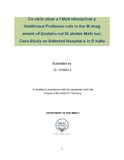| dc.contributor.advisor | Neelotpol, Dr. Sharmind | |
| dc.contributor.author | Modasser, Khadiza Binta | |
| dc.date.accessioned | 2018-01-25T10:36:49Z | |
| dc.date.available | 2018-01-25T10:36:49Z | |
| dc.date.copyright | 2016 | |
| dc.date.issued | 2016-01 | |
| dc.identifier.other | ID 12146032 | |
| dc.identifier.uri | http://hdl.handle.net/10361/9217 | |
| dc.description | This project report is submitted in partial fulfilment of the requirements for the degree of Bachelor of Pharmacy, 2016. | en_US |
| dc.description | Cataloged from PDF version of project report. | |
| dc.description | Includes bibliographical references (page 54-58). | |
| dc.description.abstract | Gestational Diabetes Mellitus (GDM) is a common metabolic disorder that occurs
during pregnancy. GDM can cause significant problems, including maternal
complications, perinatal complications, and metabolic disorders in offspring in the
later life. The primary management method for women with GDM is nutrition therapy.
Some women with GDM require diet therapy alone, while some women require both
diet and insulin therapy. The present study was aimed to evaluate the attitude of
multidisciplinary healthcare professionals in the engagement of the treatment and
management of GDM patients in Bangladesh. The sample size was selected 30 for
four groups (patient, doctor, pharmacist and authority) and data were collected from
120 participants from hospital located in Dhaka city using a paper-based
questionnaire survey. This study shows that, most of the patients (14%) had a
history of diabetes in their family; 67% of the GDM participants feel the necessity of
involvement of a pharmacist for their care, whereas, only a few think they need
assistance from nurse (17%) and dietitian (17%). Nearly 43% of the doctors think a
pharmacist can take responsibility in the management of GDM. Whereas, 57% of the
doctors cannot agree that clinical pharmacists can take a responsibility in dose
adjustment for the patients. Hundred percent of the authorities believe that
pharmacist can play a significant role in the management of GDM. Moreover, 90% of
the authorities are currently willing to have pharmacist in their patient management
supporting team. Therefore, the findings of the study can play a significant role for
the policy maker to take a decision regarding the involvement of clinical pharmacists
in the management of GDM patients. | en_US |
| dc.description.statementofresponsibility | Khadiza Binta Modasser | |
| dc.format.extent | 66 pages | |
| dc.language.iso | en | en_US |
| dc.publisher | BRAC Univeristy | en_US |
| dc.rights | BRAC University project reports are protected by copyright. They may be viewed from this source for any purpose, but reproduction or distribution in any format is prohibited without written permission. | |
| dc.subject | Healthcare | en_US |
| dc.subject | Diabetes | en_US |
| dc.subject | Urban healthcare | en_US |
| dc.title | Contribution of multidisciplinary healthcare professionals in the management of gestational diabetes mellitus: case study on selected hospitals in Dhaka | en_US |
| dc.type | Project report | en_US |
| dc.contributor.department | Department of Pharmacy, BRAC University | |
| dc.description.degree | B. Pharmacy | |

